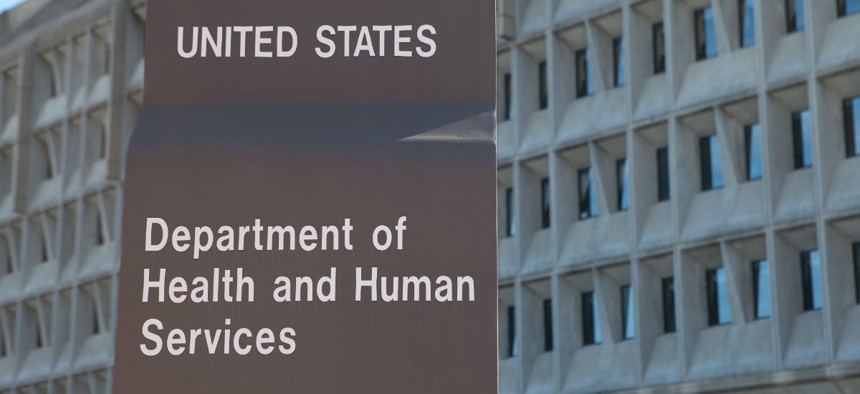
By Mark Van Scyoc / Shutterstock.com
Federal Impasses Panel Asserts Jurisdiction over HHS-NTEU Negotiations
Panel orders 30-day mediation period ending mid-December, despite pleas from union, mediation service to delay to 2019.
A council tasked with weighing in on disputes between federal agencies and employee unions at the end of collective bargaining negotiations voted to assert its jurisdiction over a spat between the Health and Human Services Department and the National Treasury Employees Union, but told the parties to try again to work out their differences first.
Last summer, HHS declared an impasse in its negotiations with NTEU over a new collective bargaining agreement after one day of negotiations, and part of another day with the help of a mediator from the Federal Mediation and Conciliation Service. Union officials have decried the negotiations as a “sham,” done in bad faith to “check the boxes” of the collective bargaining process and send it to the Trump appointee-stacked Federal Service Impasses Panel.
On Nov. 15, the impasses panel announced that it would assert jurisdiction over 28 of the 34 articles of the existing union contract that the department proposed to change or delete. But it ordered the parties to conduct more negotiations, with the aid of an FMCS mediator, over the next 30 days.
NTEU accused the panel of “putting its finger on the scale,” particularly since its members denied a request by the mediation service to delay the new bargaining period until January since mediators would only be available for two weeks, or 10 business days, during the time frame.
“The 30-day clock started running on Nov. 15, but the FMCS has only two weeks available during this period—this week starting [Nov. 26], and again for a week in December,” NTEU National President Tony Reardon said. “[We] asked HHS to come to the table again next week, even though the mediator is not available, so we can at least have three weeks, but HHS has refused that request.”
HHS did not respond to a request for comment.
For Reardon, the decision simply marks the latest slight in a running effort by the Trump administration to decimate labor in the federal sector. The impasses panel is chaired by Mark Carter, who is an attorney representing employers on labor-management issues, and several of its other members come from conservative think tanks and nonprofits, including David Osborne, whose bio describes him as the president and general counsel of a nonprofit law firm that offers “free legal services to those hurt by public employee union officials.”
“I find it unimaginable that anyone could conclude [we are at an impasse], after hearing or knowing that both parties sat down for no meaningful discussion of the proposals, and no significant or serious question-and-answer period about the proposals, and there is this notion in bargaining that it is incumbent upon the moving party—the one that actually wants to make the change—to make their case and indicate why they want to change the contract,” Reardon said. “There was none of that in this situation . . . There is a preordained notion by the agency to as quickly as possible get to the FSIP, where the folks that the president selected can make their decision and force that on employees, even though it’s a complete sham.”
Kimberly Moseley, executive director of the impasses panel, said that when a party requests the panel intervene in a negotiation, her staff conducts a preliminary investigation to learn the background of a negotiation process. She said staff often provide a recommendation to the panel on how to proceed, but that it is typically related to whether an issue falls under the purview of FSIP or her other employer, the Federal Labor Relations Authority. No staff members are in the room when the panel deliberates and votes on whether to assert jurisdiction, but she said instructions for further mediation are somewhat common when there is a dispute over how long parties have bargained.
“There’s no magic pill,” she said. “The panel just decides whether they think that [the parties] have talked enough, and then they take it from there. Sometimes they say, ‘We’ll assert jurisdiction, but there’s a little more work you can do.’ And in some cases, when they go back to the FMCS, they end up resolving the matter, and it doesn’t come back to us.”
Reardon said that NTEU will keep its options open, and is prepared to fight if there is no agreement during mediation and the union is not satisfied with the impasses panel’s final decision.
“If we have a contract imposed on us without any meaningful bargaining, we’ll avail ourselves of every legal option at our disposal, because I believe we have an excellent case with an arbitrator why there was a violation of the law that requires government agencies to bargain in good faith,” he said.







